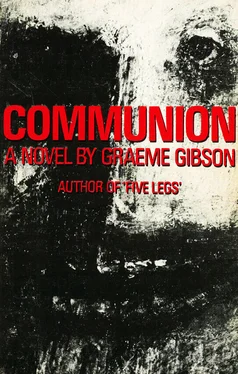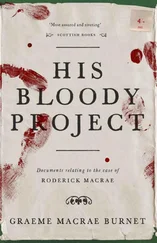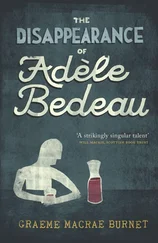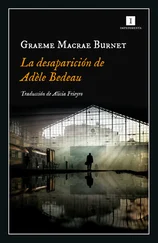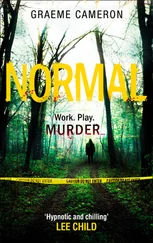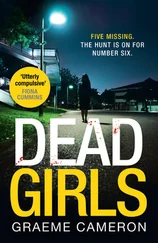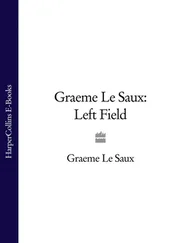Ritson’s convinced, not without reason, that he’s appreciably weaker, his body less effective: when he attempts to stand he can see that the process of disintegration has continued while he slept, there’s even reason to believe that it has accelerated. His spine doesn’t bend easily and even with help from his arms, the muscles in his belly are incapable of pulling him into a sitting position. He rolls onto his side, drawing his knees up to his chest, levering with his arms, he flops onto his belly, he struggles to raise his trunk from the mattress, the problem is to get to his hands and knees, it’s here that he’s most likely to fail: it hasn’t always been like this, he persists, he refuses to falter, there was an instant when he doubted himself, at the start, it appeared certain he’d collapse but he held on, he braced himself and won. The rest is comparatively easy. He’ll crawl to the chair and pull himself erect.
It’s a tiny room, a windowless cubicle, not a cell, in the deepest corner of his basement, he acknowledges there is light in the city, waning afternoon light, but it never penetrates this far beneath the street: the basement, honeycombed with cells and passages, has been in darkness as long as he can remember. As confident as a blind man, he crawls to the wooden chair by the door, he puts both hands on the seat and climbs to his feet. After asserting his balance he leans against the wall for support, he reaches with his arms, he stretches his body towards the ceiling with muscles and sinews protesting, he gulps air vigorously into his lungs, he holds it as long as he can and then exhales. He repeats the process until he’s trembling and dizzy. When his head clears he sits on the chair, he slips his feet into his boots, laces them to the top and ties them with a double bow.
It’s always the same, the need to urinate wakes him: he’s lying on his back in the dark, it’s like sleep but his eyes are open, the empty house above him: inescapably the prospect of rolling onto his belly, of forcing his body to its feet, fills him with uncertainty and dread. He has tried to understand. Perhaps he’s afraid of failure. There was a time, Ritson believes there was a time when this explanation convinced him, it’s all-encompassing, that’s attractive, and even more important, it’s simple: unfortunately he’s concluded that if he was afraid of failure, then he wouldn’t involve himself, he wouldn’t even try, there must be another explanation. It has occurred to him he’s afraid of what he’ll find outside the house. Without any doubt, he’s convinced there’s sound reasoning here: the shattered windows, bodies in the street he’s seen it all, men prowling like animals; he remembers, surely he wasn’t dreaming? he remembers tanks, whole blocks united in flame, the sky insanely red and soldiers with guns and clubs. But what has it got to do with Ritson? if the cause for dread lies outside, then it’s unlikely he’d go out as eagerly as he does. There’s very little need, his requirements are modest and virtually everything necessary for life has been stored here in the basement; despite this, as soon as it’s dark he slips out of the house without fear, at least without specific fears, he’s expectant certainly, even defensive, but that’s endemic. Life demands caution. Clearly then, or at least it seems so to him, there’s no obvious cause for his uncertainty and dread. And that raises the possibility he’s been approaching the problem from the wrong angle; perhaps he doesn’t understand the nature of his experience here in the dark each afternoon, on his mattress, struggling from sleep, the empty house above him. Perhaps he’s mistaken, and it isn’t uncertainty or dread that he feels, perhaps it’s frustration in response to inertia. It’s possible. If that’s the case, however, what is it that drives him to overcome the inertia? there has to be something.
If he allows himself he’ll pursue this sort of speculation forever, he’ll exhaust every combination of possibilities, and even though it’s challenging for the mind, even though it could prove to be more or less diverting, it has nothing to do with lying here, on his back, his body undeniably weaker than he has ever known it to be. A cellar is not an ideal place to die. He rolls onto his side, drawing his knees up to his chest, levering with his arms, he flops onto his belly, he struggles to raise his trunk from the mattress, to rise onto all fours, his arms are too weak, he collapses, his face bangs rudely against the cellar floor. It’s probably like this every day, soon the strength will return, he lies motionless with arm beneath him, his face is pressed against the cement.

Why does she come each morning like this? A ritual perhaps, but not for him: Christ knows he doesn’t need it! with knees pulled up under his chin for protection, the body curled around its own belly, it’s obvious he doesn’t need it. Yet here she comes with cigarettes, matches and the white plastic holder . . .
Deliberately from the door to the chair beside his face and sitting, staring impassive as he sleeps. She hears her morning at the open window. She hears birds in the eaves and she hears the trees.
She rises, she puts the cigarettes, the matches and the holder beside the pillow and, bracing her feet on the floor, her knees against the bed, she takes a deep breath and tries to wrestle him onto his back. He resists. She tries harder. He curls in upon himself like an armadillo, but grunting and clutching, sweating now and heaving, she begins to gain the advantage: he’s weakening, one of his arms comes loose! vainly he struggles to re-enclose himself but the circle’s broken . . . it’s just a matter of time. She hears a whimpering in his throat and pauses. Clever. With left hand on his right wrist, elbow against his belly and into his hip, and her right arm under his shoulders, she seems to give in to him. Very clever. His body, surprised at this unexpected freedom, relaxes, the whimpering dies . . . and at this instant, so beautifully timed, she surges to her feet and flips him onto his back.
Things proceed as usual.
Felix open on his back, he breathes the end of sleep.
Cigarette in her mouth, she rests. It’s getting harder all the time. Once it was strength alone that did it, she walked in at seven and simply rolled him over. But those days are gone now: more and more she has to rely on the advantage that comes with experience.
She lights a cigarette and slips it into the holder. There are birds outside and trees that press about the house: the sun is shining, rather pale at this hour, but shining nevertheless as she leans forward to brush her finger lightly at the corner of his mouth. He shivers, he searches blindly with a sucking noise, his face is pained, is drawn in lines as his mouth searches suck suck. Such an anxious face!
By resting her elbow at his side she keeps the holder steady; her arm along his chest, she bends and reaches, pinching the nostrils to stop him breathing through his nose. The effect is immediate, obvious. The cigarette glows more brightly, it fades to greyness, then it glows again, it fairly crackles! Miniature forms collapse upon themselves as he exhales. She leans her weight, pressing and counting, “a thousand and one” with smoke issuing from his mouth . . . briefly she holds . . . then “a thousand and two”, withdrawing she sees the fire as his lungs are filled. And so it goes. She fights him resolutely, pressing again (“a thousand and one”), she feels the slobber from his mouth, she pauses . . . and withdraws.
Читать дальше
